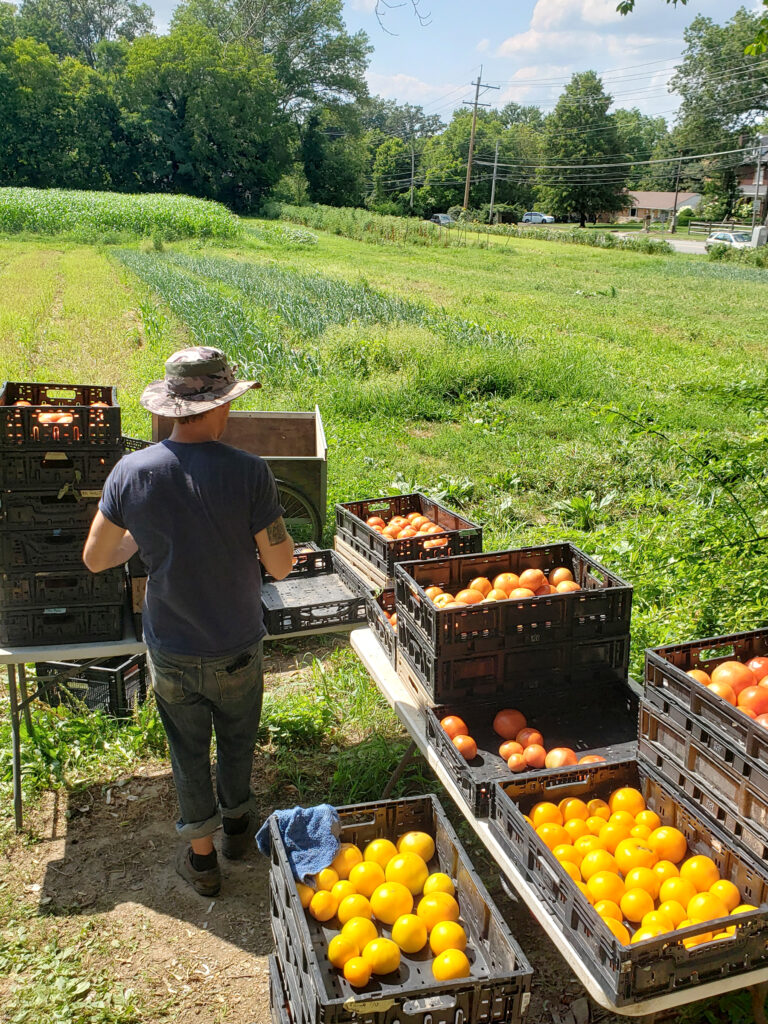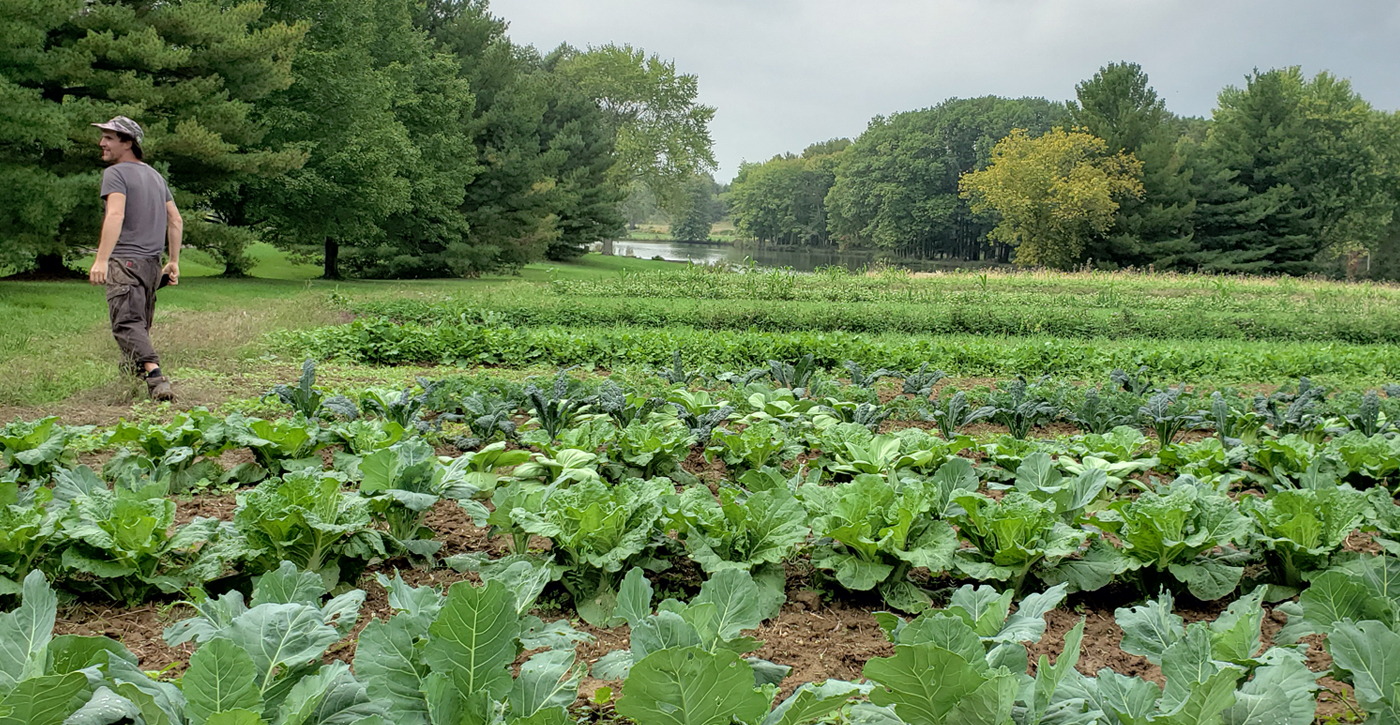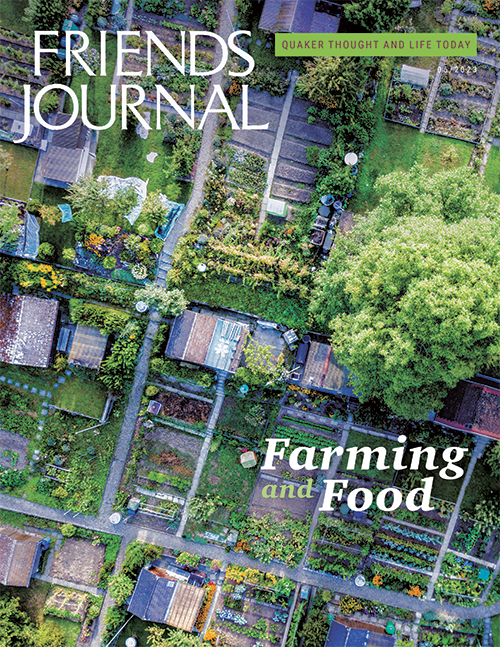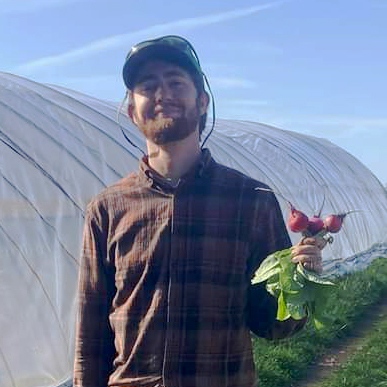Cultivating Plants and Presence on the Farm
Growing food organically is not just a job for me, but a way of life. I’m passionate that it’s healthier for both people and the land and that it celebrates an alternative to mono-cropped, synthetic-chemical operations. Honoring Mother Nature by not using harmful chemicals is the first step to growing healthier food and healing our relationship with the earth.
My agriculture journey started with a vegetable garden that my parents kept in our yard. They had taken classes and learned more about organic gardening with each successive season of planting and tending. In that garden, I occasionally assisted or helped with volunteer hours for the CSAs we belonged to. Later in high school, I attended workshops at a sustainable farming conference. I saw how much there is to learn about growing food, and I felt a sense of community. Leaving that conference, I felt truly inspired about agriculture.
I attended a college with an organic farm that provided food for the dining hall. I was able to learn by being on the gardening crew for a year. After the sedentary classroom work, I would walk down to the garden area by the river to start my work shift at 3 p.m. during the week, and on the weekends, we’d rotate who did the needed chores. Working on the garden crew revealed the joy, glory, hard work, and community that arises from growing food together.
I’ve always tried to eat mostly organic food, but learning about regenerative agriculture has been a level up. For me, participating in a book discussion group around Paul Hawkin’s Drawdown: The Most Comprehensive Plan Ever Proposed to Reverse Global Warming emphasized the role regenerative agriculture plays in solving the climate crisis. Regenerative practices include rotating crops, growing cover crops, avoiding synthetic chemicals, low- and no-till farming, and applying compost as fertilizer. These practices help an operation use less fossil fuel and fix carbon in the soil. Healthy food starts with healthy soil, which is the basis of regenerative agriculture.
Those are the practices we use on the vegetable operation I’ve worked at seasonally for the past two years. Our Harvest Cooperative is a cooperatively owned business that farms on about ten acres and is a member of the food-workers’ union. We grow a wide variety of vegetables and distribute them through a 200-member weekly CSA, a farmers market, a farm stand, and wholesale to customers. Nobody makes much money, which is a challenging reality for many small farmers. There are plenty of fringe benefits though, such as getting to work outside and taking home imperfect veggies. This past year was the business’s tenth anniversary, which we celebrated with a dinner and music fundraiser. The caterer used food from the farm for the meal, and music was provided by the band of one of my coworkers. The weather was fantastic for showing off the farm to the 150 people that attended.

This work is a spiritual practice, in the sense that it’s about tending to the plants in a present and centered way, day after day. It’s through this meditation with soil, seed, plant, and coworker that a simpler way of life reveals itself. I often say that I’m more of an active meditator whether working on the farm, playing sports, or hiking. Sitting in worship each week is sometimes more of a marker of the week and less of a fertile spiritual ground. I find it easier to be in that positive, present-centered flow state when active. Working on the farm requires a presence to the tasks at hand, such as weeding and harvesting the vegetables.
I’ve found working on a farm to be a positive boost to my mental health. It’s grounding to work with soil and plants each day, while it’s humbling to weed for hours in the hot sun. There are so many frivolous and commercial distractions that are baked into modern society. Distractions arising from the technology have created many negative health consequences; people ordering lots of stuff online is one offshoot. During one holiday season, I worked as a driver helper for UPS, and I saw the epitome of excessive consumption; I found it disorienting and ungrounding. Riding around in the van and running endless packages to doorsteps isn’t for me. It’s by consistently turning back to the land that I’ve found great inner peace.
The challenges of farming are numerous, from figuring out a long-term location, to financial struggles, to dealing with weather extremes and physically challenging work. Many farmers on small farms struggle financially when they don’t have off-farm jobs. The two locations that we farm are both leased. The owners of one were in their 80s without children when they decided to donate the land to a conservation group in 2021. Now it will be preserved as a farm in perpetuity; that is a relief for us to have that long-term security.
Turning a profit or significantly raising wages has eluded us, but we’re structured as a nonprofit, which has enabled us to get grants to cover budget deficits. A lot of government support for agriculture is focused on large mono-cropped operations, where subsidies and crop insurance are provided to continue that form of unsustainable farming. I hope in the future that the farm bill and U.S. Department of Agriculture will focus more on incentivizing sustainable practices.
I think of my farmer ancestors who lived in Ohio (previously in France and Ireland) working the land, and how I’m carrying on their way of life. As I work outside, I observe the changes and cycles of nature and how they affect the crops. There’s an Alan Watts quote that nicely applies:
The art of life is more like navigation than warfare, for it is important to understand the winds, the tides, the currents, the seasons, and the principles of growth and decay, so that one’s actions may use them and not fight them.
It’s through this approach of working with nature and attempting to understand it that I strive to become a better farmer. I’m not sure how long I can continue this work, but I plan to at least keep on growing food in some way. Hopefully, one day all food will be grown organically in a way that better respects the workers, customers, and the planet.
It’s best to not overly rely on the globalized economy that heavily requires fossil fuels with their continual supply-chain issues and rising costs. Instead, we can buy food from a farmers market, join a CSA, and begin our own gardens. A coworker said “a culture from the soil is stronger than one from the factory.” As Quakers, many of our values and testimonies are involved in decision making about food: values such as integrity, community, and simplicity. I think that organic, local, and regenerative vegetables from field to plate really honors these values in a beautiful way.







Great article. I really enjoyed reading it.
I am your father’s neice.